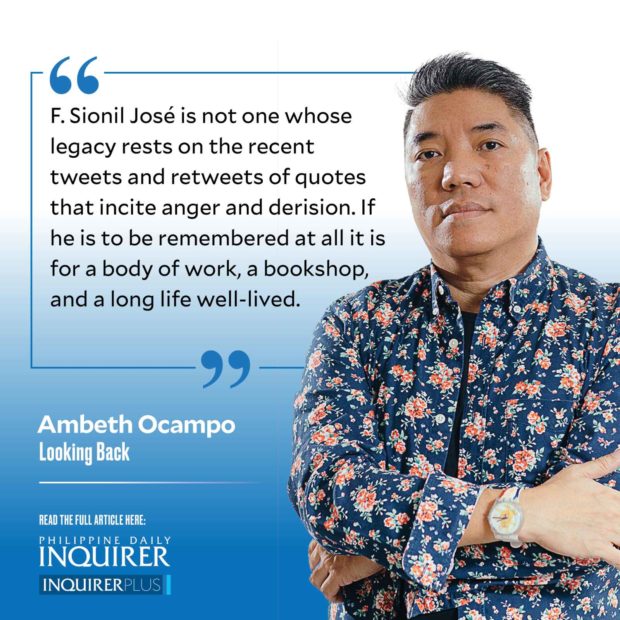My father who passed away at 94 was looking forward to his P100,000 centennial bonus, the same was true for F. Sionil José, National Artist for Literature who missed it by three years. Unlike most seniors in the predeparture area, Frankie was caustic, combative, and controversial in his last two decades. His published views were often contrarian, and on hot issues: President Duterte’s incompetence or his war on drugs, the non-renewal of the ABS-CBN franchise, and Maria Ressa’s Nobel Peace Prize were classic clickbait. It is easy for keyboard warriors who do not know him or have not read his work to dismiss him for opinions contrary to their own. They did try, but one cannot cancel F. Sionil José.
I asked him once why, in his twilight, he was always angry. He replied that his biggest frustration was that the world did not turn out the way he wanted or imagined it to be. He was angry from the realization that he was leaving to a new generation a world far worse than that he was born in. In jest, I warned his genial and patient wife, Tessie, that if Frankie continued on this warpath, his nickname might as well change into “Cranky.” Worse, some might label him as “F. Senile José.”
F. Sionil José is not one whose legacy rests on the recent tweets and retweets of quotes that incite anger and derision. If he is to be remembered at all it is for a body of work, a bookshop, and a long life well-lived. I knew him almost as a grandfather and I can tell you that his opinions may be sharp, but what he said was never mean or bad-spirited. What appeared so was his way of inciting debate, not a fight. A pity that some of those he nurtured and loved in recent years publicly cut off from him, drawing battle lines to force him to be what they wanted or imagined him to be.
We did not agree on a number of things like his Cold War view of the world and history, but I let him be. I kept a distance when needed. I knew and saw how he was always attentive to young people, aspiring writers, and artists. He was genuinely interested in what they had to say, and the promise he saw in most of them. He encouraged many, like myself, at a time when they were starting out: unsure of themselves, their writing, their future. Oh, how he roared when we first met in 1988; I told him that I had been frequenting his iconic Solidaridad Book Shop on Padre Faura dreaming of one day being a bookseller too. As a matter of fact, I actually thought he lived in the mansion next door, and that thought made me believe, wrongly of course, that one could live on writing.
Once Frankie brought me on a memorable trip to the north, first to Pangasinan to appreciate the landscape of his Rosales novels, ending in Ilocos Norte to talk about life and survival during Marcos’ martial law. In Rosales, his birthplace, he showed me the lamppost where he read at night because they did not have electricity at home. He narrated how the novels of Rizal inspired him, particularly the story of Sisa and her sons that brought him to tears and awakened him to the inequality and oppression that plagues Philippine society then and now.
Frankie told me about Apolinario Mabini who left the Malolos Government and retreated to the Balungaw hot springs to rest the limbs made numb and lame by syphilis. I told him that Mabini lost the use of his legs due to late onset of polio, the syphilis rumor generated by his political enemies in the Malolos Congress. That conversation led a correction in his novel “Po-On” (Dusk) and a lifelong friendship. In his “Notes on the writing of Dusk” (1998), he referred to our conversation and apologized for accepting the syphilis story as true and presenting it as fact in the novel, in those notes he gave Mabini his due.
In 1999, a decade after we first met, he sent me the hardcover US edition of his novel “Sins” inscribed: “There is a fastidious young historian here named Lamberto Campo. I think you’ve met him.” It’s 2022, I am not young anymore but looking back on the legacy of F. Sionil José at his passing and looking forward, one cannot but be grateful for a life that, rightly or wrongly, impacted many others who will leave the world changed from what it was before.


